Books
Books
published in 2023
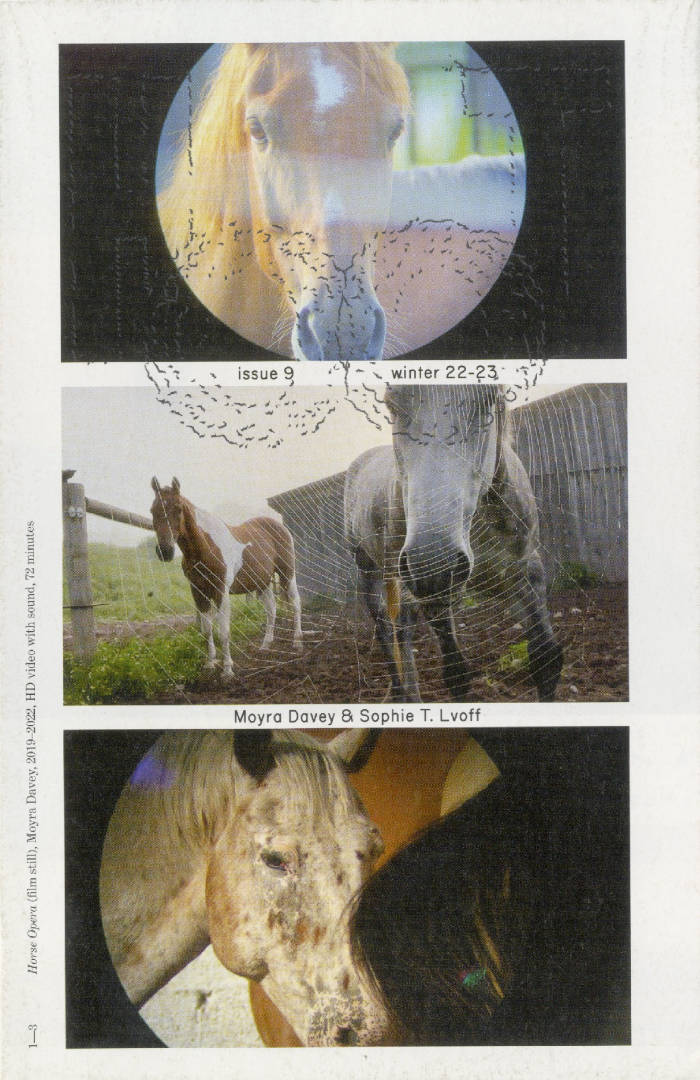
HOOT nr. 9 — Moyra Davey & Sophie T. Lvoff
The 9th HOOT pops up for the winter 2022-23, but the conception of this issue started well over a year ago at our beloved Plage Avant (Traduttore, traditore’s studio, Marseille).
We met Sophie T. Lvoff at many openings and art related events in Marseille these last few years, having a practice that appears mainly as photography, Gufo got curious about all the processes that she uses which involve sound, installation, writing… and more. She welcomed us in her studio of the city of Marseille where she recently settled.
We found out about the “trompe-l’œil” of this iconic checkered table, witnessed the installations of translucid and colored objects evolving on the sunny wall, and looked through her photographic chamber it’s called a large-format camera, but this is funny… For this issue, Sophie suggested to interview another artist, Moyra Davey, who also works in photography and writing, and appeared to have shared experiences too.
The topics of everyday life, intimacy that images embody in both their works, take another dimension as soon as their thoughts, voices and writing expand and express the entirety of their gestures.
This issue is the first interview between two native English-speaking artists, who have ties to the French language from childhood.
The penpals are the main characters of that encounter where we are very welcome to join in their very generous conversations. This is only an excerpt of a long and well referenced correspondence.
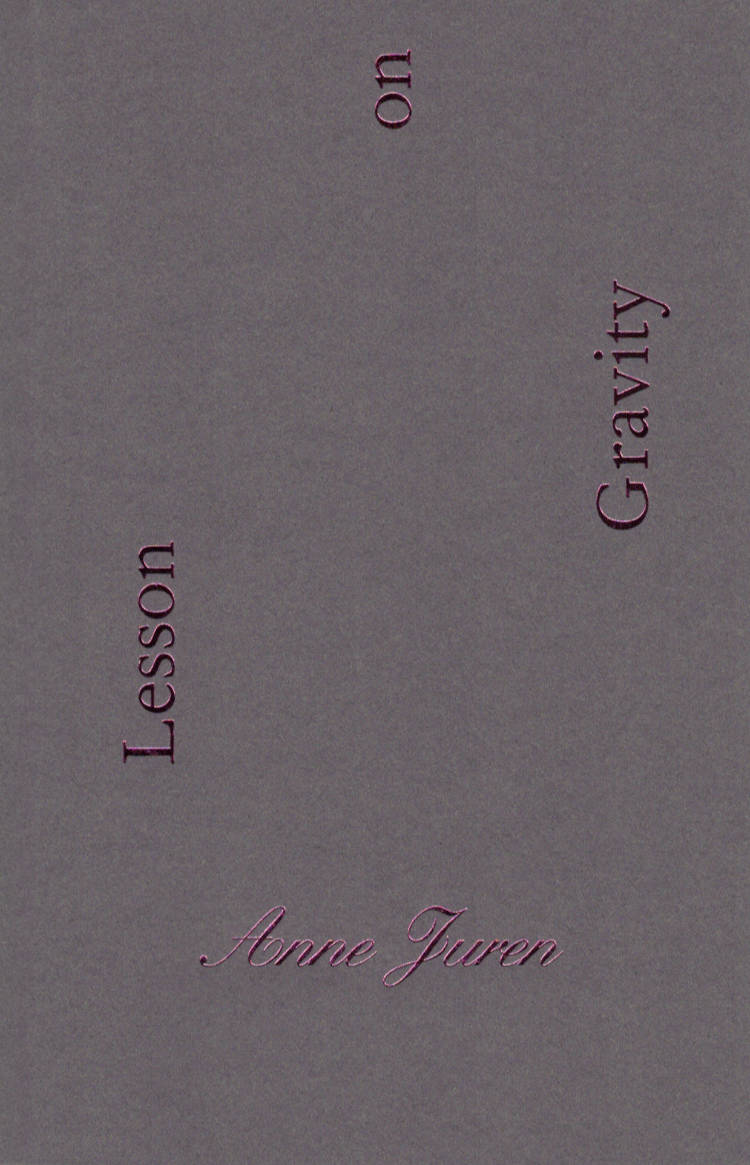
Lesson on Gravity
Lesson on Gravity is a slice of Anne Juren’s ongoing artistic research into ‘fantasmical anatomies’. ‘What happens when our sense of ground, orientation and support is lost? What are the risk and the promise of detaching ourselves from the pull of gravity?’ As this apocryphal Feldenkrais lesson embraces moments of intrusion and fragmentation, poetry and flights of fancy, it shows how language is alive, embodied and liquid. It also invites the reader to treat the book itself as a body, an unruly tongue sticking somewhere in its folds and creases
Anne Juren is a choreographer, dancer and Feldenkrais practitioner. In 2021 she finished her PhD at Stockholm University of the Arts with the project Studies on Fantasmical Anatomies.
Published by Varamo Press in the essay series Gestures
First edition, March 2023
Graphic design by Michaël Bussaer

Let Them Rot: Antigone's Parallax
A provocative, highly accessible journey to the heart of Sophocles' Antigone elucidating why it keeps resurfacing as a central text of Western thought and Western culture.
"Zupančič writes with rare lucidity and patience for exposition, helped along by a talent for turning peculiar phrases or seemingly senseless jokes into full-blown insights. Her ideas are fresh, as if they hailed from some open air beyond the clutter of current theoretical quarrels. This brilliant account of Antigone breaks new ground for philosophy, psychoanalysis, and political and feminist theory."—Joan Copjec, Brown University
There is probably no classical text that has inspired more interpretation, critical attention, and creative response than Sophocles' A ntigone. What is it about the figure of Antigone that keeps haunting us? To what kind of always contemporary contradiction does the need, the urge to reread and reimagine Antigone—in all kinds of contexts and languages—correspond?
The violence in Antigone is the opposite of "graphic" as we have come to know it in movies and in the media; rather, it is sharp and piercing, it goes straight to the bone. It is the violence of language, the violence of principles, the violence of desire, the violence of subjectivity. From this question of violence, the author turns to questions of funerary rites and of the relation of Antigone's singularizing claims to her universal appeal. What, Zupančič asks, does this particular (Oedipal) family's misfortune, of which Antigone chooses to be the guardian, share with the general condition of humanity? This forces us to confront the seemingly self-evident question: "What is incest?"
Let Them Rot is Alenka Zupančič's absorbing guided tour of the philosophical and psychoanalytic issues arising from the Theban trilogy. Her original and surprising account illuminates the play's ongoing relevance and invites a wide readership to become captivated by its themes.
Alenka Zupančič is Professor of Philosophy and Psychoanalysis at the European Graduate School and a researcher at the Institute of Philosophy at the Slovene Academy of Sciences and Arts. Her books include What IS Sex?, The Odd One In: On Comedy, and Ethics of the Real.
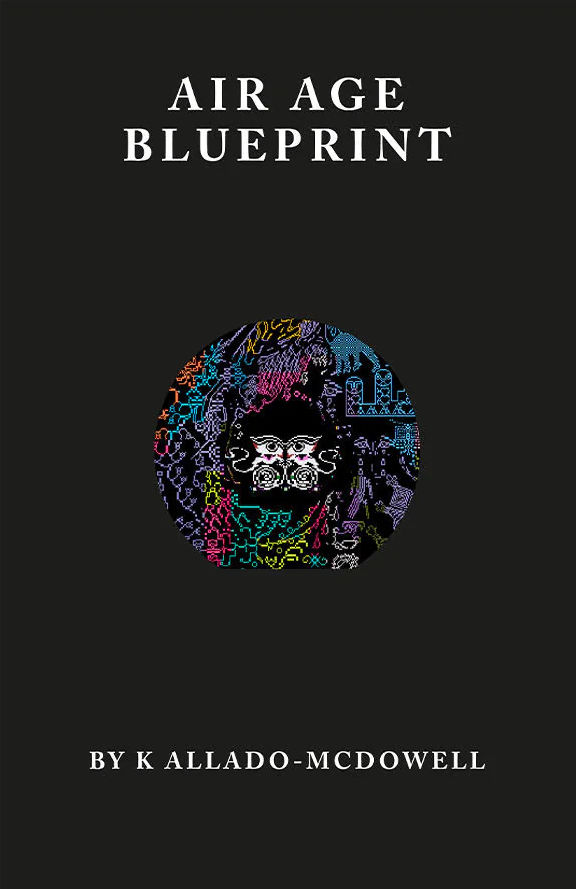
Air Age Blueprint
A young filmmaker’s life is disrupted by a fated encounter with a Peruvian healer. Called to twin paths of artistic creation and mystic truth-seeking, they set out on a transcontinental journey. In the Pacific Northwest they meet K, a double agent working between art and technology, who invites them to test a secret program called Shaman.AI. This human-machine experiment, rooted in magic, produces a key to rewriting reality – a manifesto describing how entangled human and non-human intelligence will remake our technologies, identities and deepest beliefs.
Allado-McDowell (along with their AI writing partner GPT-3) weave fiction, memoir, theory and travelogue into an animist cybernetics – an air age blueprint.
Cover art by Somnath Bhatt

Making Kin
Institute for Postnatural Studies
When we practice becoming with another’s experience, we practice empathy. When we embody collectiveness, we understand ourselves as a whole and therefore feel no separation. What would it be like to inhabit a body without limits or definition? Which words and meanings make us feel like “non-animals”? The literary genre of xeno fiction proposes an exercise of ethological research and imagination, placing our body inside another’s perspective. This publication convenes writers and non-writers that have experimented with animal embodiment to create literary works and visual interpretations that explore different ways to experience “otherness.” In this volume of the Making Kin series, we focus on non-human animals and hybrid bodies.
Authors: Zoë De Luca Legge, Esther Merinero, Eva Piay, John Kazior, Jorge de la Cruz, Marianne Hoffmeister Castro , Luca E. Lum, Anonymous, Paula Proaño Mesías, Laura Dominguez Valdivieso, Adèle Grégorie, Morgan Wood

We Know What Remains Unsaid
Ramaya Tegegne, Tiphanie Blanc
The second volume of a new series of publications by the collective Wages For Wages Against, acting for better work conditions in the visual arts and against all forms of discrimination.
We Know What Remains Unsaid presents research on the mechanisms of invisibilisation of precarious realities and activist knowledges. It investigates what our silences and the unsaid reveal. By giving a voice to several researchers, activists and collectives, this volume records silent words, forgotten stories, invisible struggles and thus makes possible the construction of alternative common narratives.
Wages For Wages Against (WFWA, wfwa.ch) is a a militant collective and a campaign for the fair remuneration of artists in Switzerland, better work conditions, and an alternative economy of the arts.
Edited by Tiphanie Blanc and Ramaya Tegegne.
Contributions by Gufo, Tiphanie Blanc, Johana Blanc, L'eau à la Butch, Tiziri Kandi, Noémi Michel, Olga Rozenblum.
Graphic Design: Roxane Maillet.

Ka Kualmaku
This artist's book is the achievement of the Ka Kualmaku project conducted in 2018 during a residency of Marc Buchy in Colombia, in Lugar A Dudas, during which the artist began to learn Namtrik, said to be a disappearing language. The book restores this learning as a Namtrik-French language guide.

Hate Poems
no more poetry presents HATE POEMS, the the debut anthology by writer Natalie Mariko.
"I spent a lot of time with HATE POEMS. On planes, on beachfronts, in cars, on top of lovers, inside and outside cafes. In hard moments of the Southern Hemisphere and loud moments on trains in the Northern Hemisphere, and of course I was with the poems in many in between times. What it gave me was the kind of perspective shift reserved for important works of deep spiritual engagement. The book showed me how poetry simply already exists and formed a deeper understanding of the poet as a custodian to awe — a guide through space, absorbing. It is an electric read. It puts my radar on high and beacons me to find poetry. It is a book of poems that invites the reader to observe language within what they already know, and understand how there might be something worth exploring within what you call your every day. Train sounds become harmonic, street chatter becomes hypnotic and vital. The writing is observant. And so it’s bold at times, others timid or hurried, frightened or confident. This book lets many things become poetry. The poet has collected striking moments and sounds and meticulously laboured, deliberated and manoeuvred over their presentation within this book. It arrives at its most maximum, exploding in rhythmic and prosodic pleasures. A collection of motivations and melodies of vibrant transsexualism."

On the Benefits of Friendship
Isabelle Graw reflects on the purposes and struggles of friendship in competitive social milieus.
By focusing on her own social milieu—the art world—Graw demonstrates how friendships are neither totally disinterested nor reduceable to their use. Written in the intimate form of a fictional diary, this book laments useful friendships while praising true friendship in all its forms. For Graw, friendship is an existential necessity—if only because it points to how we relate to and depend on others. Friendship, she finds, is as important as the air we breathe—with it, we are able to fully live.
"On the Benefits of Friendship strangely calls to mind the fictional schoolboy-diary format Robert Walser staged to deliver his first novel. Aware of its own performance while successfully assuming its desired voice, Graw's diaristic story is a clever vehicle for social critique of utility friendships."
— Stephanie LaCava, author of I Fear My Pain Interests You
"Isabelle Graw has written the Elective Affinities for the twenty-first century, as a feminist novel and a dysfunctional family portrait set in the contemporary art world."
— Violaine Huisman, author of The Book of Mother
Isabelle Graw is Professor for Art Theory and Art History at Staatliche Hochschule für Bildende Künste (Städelschule), Frankfurt am Main, where she co-founded the Institute of Art Criticism. She is an art critic and co-founder ofTexte zur Kunst in Berlin.

The Black Technical Object – On Machine Learning and the Aspiration of Black Being
A contemplation on the abstruse nature of machine learning, mathematics, and the deep incursion of racial hierarchy.
This book aims to introduce the history of statistical analysis and a knowledge of sociogenesis—a system of racism amenable to scientific explanation—into machine learning research as an act of impairing the racial ordering of the world. While machine learning—computer programming designed for taxonomic patterning—provides useful insight into racism and racist behavior, a gap is present in the relationship between machine learning, the racial history of scientific explanation, and the Black lived experience. Ramon Amaro explores how the history of data and statistical analysis provide a clear (and often sudden) grasp of the complex relationship between race and machine learning. Amaro juxtaposes a practical analysis of machine learning with a theory of Black alienation in order to inspire alternative approaches to contemporary algorithmic practice. In doing so, Amaro offers a continuous contemplation on the abstruse nature of machine learning, mathematics, and the deep incursion of racial hierarchy.
Ramon Amaro is Lecturer in Art and Visual Cultures of the Global South at University College London. His writing, research and practice emerge at the intersections of Black Study, psychopathology, digital culture, and the critique of computation reason.

Wonderflux – A Decade of e-flux Journal
Wonderflux brings together a group of longtime contributors with graphic artists to collaborate on illustrated essays and develop a new pictorial language around some of the emergent consistencies and overarching issues that defined the first decade of e-flux journal.
In Wonderflux you will find yourself in front of disappearing mirrors held up to curators, critics, and artists; sailing through counterfactual universes; face-to-face with cold-blooded killers, faceless men, weary but buoyant prophets; all the while imbued with stubborn thriving and stubborn refusal to be moved or monetized, and once in a while having earnest conversations with robot(s and) workers.
The authors included here have shaped the varied concerns and urgencies of e-flux journal since 2008. As a theory-driven art journal made up entirely of hypertext and digital images and embraced by academic circles, we sometimes wonder about the artistic and sensual use of text and image. Does the thinking of some of our favorite authors also speak to a place beyond floods of automatic links and references and rectangular photographic portals? To a broader and more applied artistic domain like the imaginative sensibility of illustration, where entire worlds arise from the simple and deliberate placement of lines on paper?
Contributions by Franco “Bifo” Berardi, Raqs Media Collective & Freddy Carrasco, Liam Gillick, Elizabeth A. Povinelli & Clara Bessijelle Johansson, Martha Rosler & Josh Neufeld, Reza Negarastani & Keith Tilford, Hu Fang & Mojo Wang, Keller Easterling & Meijia Xu.

BRAIDS
Natalia Irena Nikoniuk, Gabriela Galeao Batres
BRAIDS is a 130 pages-long publication that features both visual and written works of 20 young creatives. The desire of BRAIDS is to expand the idea of queerness beyond the borders of identity. The journal exists to host bodies that deny framing and dare to expose the vulnerability of their difference. The publication is thus a woven story of the contemporary globalised queer, insecure but daring, honey-glazed yet continuously aching.

Cyberfeminism Index
Hackers, scholars, artists and activists of all regions, races and sexual orientations consider how humans might reconstruct themselves by way of technology.
When learning about internet history, we are taught to focus on engineering, the military-industrial complex and the grandfathers who created the architecture and protocol, but the internet is not only a network of cables, servers and computers. It is an environment that shapes and is shaped by its inhabitants and their use.
The creation and use of the Cyberfeminism Index is a social and political act. It takes the name cyberfeminism as an umbrella, complicates it and pushes it into plain sight. Edited by designer, professor and researcher Mindy Seu (who began the project during a fellowship at the Harvard Law School's Berkman Klein Center for the Internet & Society, later presenting it at the New Museum), it includes more than 1,000 short entries of radical techno-critical activism in a variety of media, including excerpts from academic articles and scholarly texts; descriptions of hackerspaces, digital rights activist groups, bio-hacktivism; and depictions of feminist net art and new media art.
Contributors include: Skawennati, Charlotte Web, Melanie Hoff, Constanza Pina, Melissa Aguilar, Cornelia Sollfrank, Paola Ricaurte Quijano, Mary Maggic, Neema Githere, Helen Hester, Annie Goh, VNS Matrix, Klau Chinche / Klau Kinky and Irina Aristarkhova.
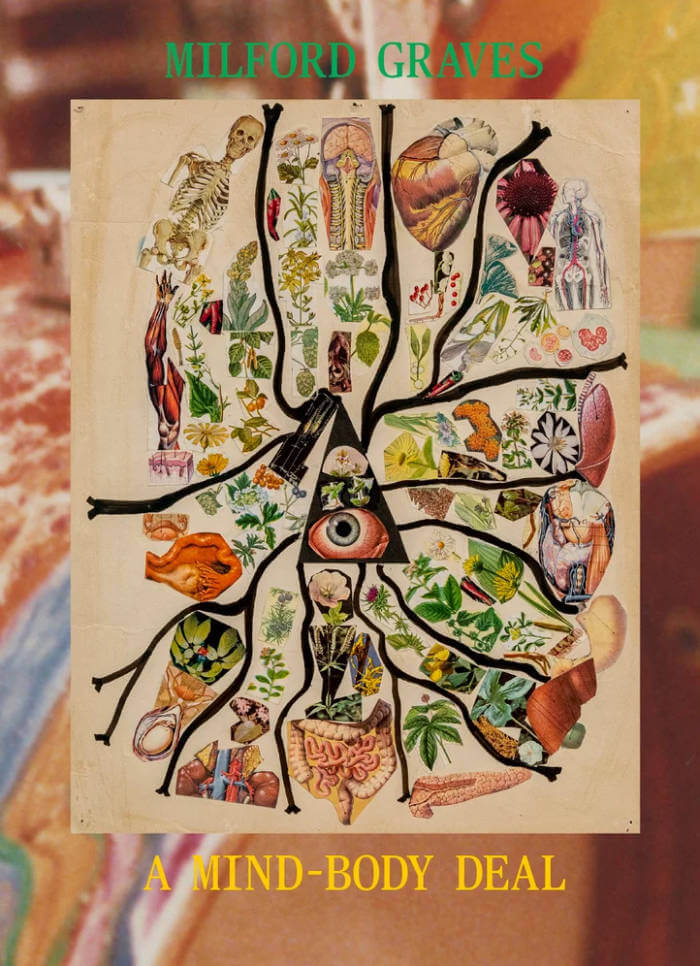
Milford Graves: A Mind-Body Deal
The first-ever overview on the multimedia art of free-jazz pioneer and creative polymath Milford Graves
Milford Graves (born 1941) has been a revelatory force in music since the mid-1960s, liberating the drummer from the role of "timekeeper" to instrumental improviser and giving rise to the free-jazz movement, with groundbreaking performances alongside Lou Reed, Min Tanaka and John Zorn.
But music cannot contain the energies of his creativity and intellect. Graves' kaleidoscopic genius led him to develop an unprecedented body of interests—from medicine to botany, stem-cell regeneration to martial arts.
A Mind-Body Deal gathers the multifaceted work of Milford Graves, exploring the practices and predilections of this extraordinary mind. Fully illustrated, this catalog includes documentation from the eponymous show at ICA Philadelphia, exhibiting a collection of Graves' hand-painted album covers and posters, idiosyncratic drum sets, recording ephemera, multimedia sculptures, photographs and costumes, with elements from his scientific studies.

Know Thy Audience
Know Thy Audience, Nadia de Vries’ third poetry collection, disavows the platitude from which it takes its name and makes the reader complicit in both her aggression and her submission, sparked by a history of domestic abuse that escapes all euphemism and metaphor – but not poetry altogether.
Speaking—or rather, singing—as a ‘battered woman’ from a working-class neighborhood, De Vries’ aphoristic writing belies a vengeful reversal of roles in which the author—and not her perpetrator—pulls the strings. Who is the victim in these poems? Can violence be redeemed through esthetic metamorphosis? Or can powerlessness only be transferred as fetish? Know Thy Audience investigates the extent to which a victim can share their wounds, and to what degree an audience can—sensibly, ethically—be burdened with painful knowledge.

Faux Pas: Selected Writings and Drawings (2nd edition)
This new edition of Faux Pas, the acclaimed collection of writings by Amy Sillman, comes as an expanded edition, with the addition of new essays, including recent texts on Paul Cézanne, Carolee Schneemann, Elizabeth Murray and Louise Fishman. The previously unpublished text from a lecture on drawing complements Sillman's views on color and shape. New drawings from 2020-22 include a selection of works on paper that were part of the artist's installation at the 59th International Venice Biennale, The Milk of Dreams, in 2022.
Since the 1970s, Sillman, a beloved and key figure of the New York art scene, has developed a singular body of work that includes large-scale gestural paintings blending abstraction with representation, as well as zines and iPad animations.
Over the past decade, Sillman has also produced stimulating essays on the practice of art or the work of other artists: for example, reevaluating the work of the abstract expressionists with a queer eye; elaborating on the role of awkwardness and the body in the artistic process; and discussing in depth the role and meanings of color and shape. Featuring a foreword by Lynne Tillman, Faux Pas gathers a significant selection of Sillman's essays, reviews and lectures, accompanied by drawings, most of them made specially for the book.
Faux Pas aims at revealing the coherence and originality of Sillman's reflection, as she addresses the possibilities of art today, favoring excess over good taste, wrestling over dandyism, forms over symbols, with as much critical sense as humor.
Based in New York City, Amy Sillman (born 1955) is an artist whose work consistently combines the visceral with the intellectual. She began to study painting in the 1970s at the School of Visual Arts and she received her MFA from Bard College in 1995. Her work has been exhibited internationally, including at the Whitney Biennial in 2014 and the Venice Biennale in 2022; her writing has appeared in Bookforum and Artforum, among other publications. She is currently represented by Gladstone Gallery, New York.

In Pursuit of Revolutionary Love: Precarity, Power, Communities
Violence is arrayed against us because we’re Black, or female, or queer, or undocumented. There is no rescue team coming for us. With that knowledge, we need a different operational base to recreate the world. It is not going to be a celebrity savior. Never was, never will be. If you’re in a religious tradition that is millennia-old, consider how the last savior went out. It was always going to be bloody. It was always going to be traumatic. But there’s a beauty to facing the reality of our lives. Not our lives as they’re broken apart, written about, and then sold back to us in academic or celebrity discourse. But our lives as we understand them. The most important thing is showing up. Showing up and learning how to live by and with others, learning how to reinvent ourselves in this increasing wasteland. That’s the good life.
Foreword by Da’Shaun L. Harrison.
Afterword by Mumia Abu-Jamal.
"Joy James’s Revolutionary Love is umph-degree love; or love beyond measure. It is anything love. It is love without reckoning. It is love that dares all things, beyond which others may find the spirit-force to survive; to live to fight another day. Such love is also fighting itself, for the sake of ensuring that others may live." — Mumia Abu-Jamal
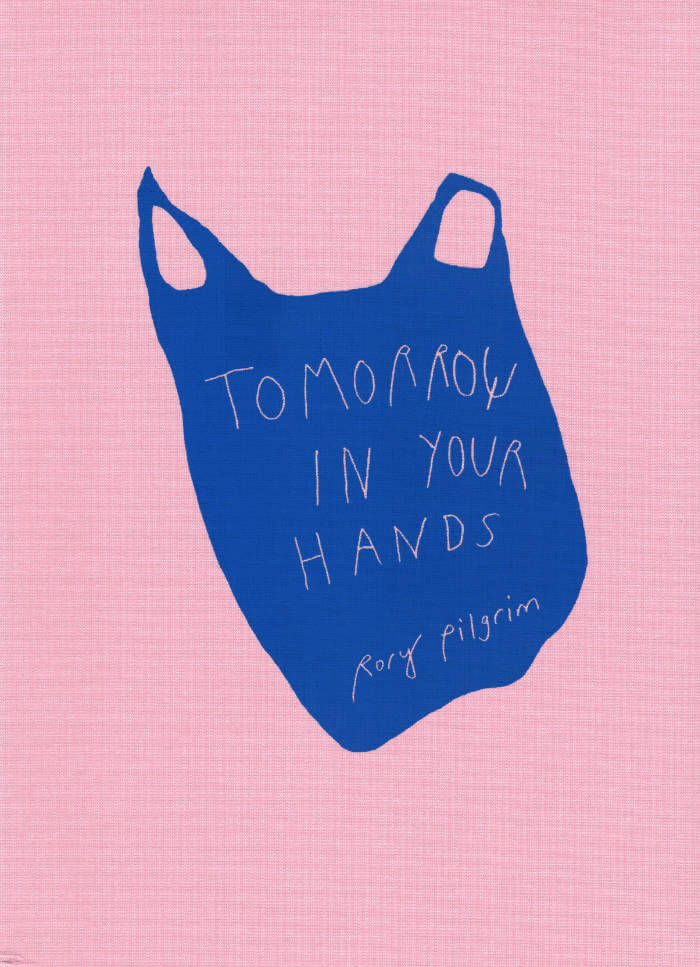
Tomorrow in Your Hands
Rory Pilgrim presents their first catalogue, bringing together their multifaceted practice as a filmmaker, composer, and more. Sharing work produced since 2008, this lovingly made book designed by Modern Activity includes sketchbooks, scores, song lyrics, and poetry. It is published on the occasion of the exhibitions Where The Tide Takes Us, Kunstverein Braunschweig, Germany, and Radio Ballads, Serpentine Gallery, London.
Rory Pilgrim (born 1988 in Bristol) works in a wide range of media including songwriting, composing music, film, music video, text, drawing and live performances. Centred on emancipatory concerns, Pilgrim aims to challenge the nature of how we come together, speak, listen and strive for social change through sharing and voicing personal experience. Strongly influenced by the origins of activist, feminist and socially engaged art, Pilgrim works with others through a different methods of dialogue, collaboration and workshops. In an age of increasing technological interaction, Rory Pilgrim's work creates connections between activism, spirituality, music and how we form community locally and globally from both beyond and behind our screens.
Edited by Rory Pilgrim, Jule Hillgärtner, Nele Kaczmarek, Zsa-Zsa Eyck, Matthew Appleton.
Texts by Jerry Brady, Jule Hillgärtner, Nele Kaczmarek, Human Poney, Louwrien Wijers.